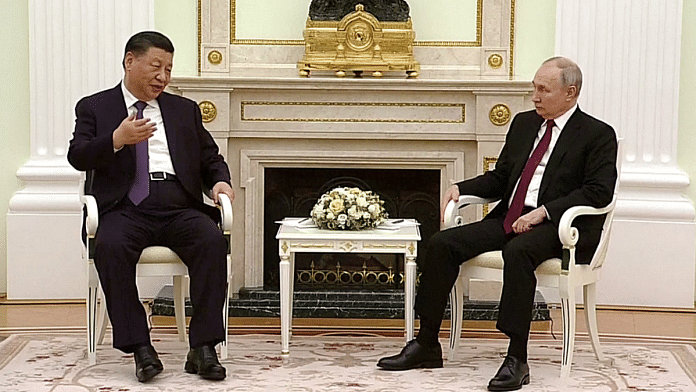New Delhi: Russian President Vladimir Putin and a delegation from the Taliban will be rubbing shoulders in Beijing as they participate in the two-day third Belt and Road Forum (BRF) for International Cooperation being hosted by China starting today.
Putin, who skipped both the BRICS summit held in South Africa earlier this year and the G20 summit in New Delhi in September — will be making his first visit outside former Soviet Union countries since the Hague-based International Criminal Court (ICC) issued an arrest warrant for him in March this year over the alleged unlawful deportation of children from Ukraine.
On 7 September, 2013, President Xi Jinping of China, in a speech in Kazakhstan, proposed to build a ‘Silk Road Economic Belt’ with Central Asian Countries.
Touted as the ‘project of the century’, more than 150 countries joined the Belt and Road Initiative (BRI) over the years. The project envisages new trade routes connecting China with the rest of the world and includes construction of ports, roads, railways, airports and other infrastructure.
The BRF brings together the participant countries in the BRI. The first forum was held in 2017 and the second in 2019, before Covid-19 delayed the third forum.
The third forum has been on the agenda since at least March 2023, when the then foreign minister Qin Gang announced it as one of the two diplomatic events being planned for the year during a meeting with the media.
Representatives from over 140 countries are expected to attend the third BRF, according to a report by Chinese news agency Xinhua.
The list of international leaders attending the BRF this year includes Hungarian Prime Minister Viktor Orban, Cambodian PM Hun Manet, Pakistan’s caretaker PM Anwaar ul Haq Kakar, President of Chile Gabriel Boric, President of Kenya William Ruto, Ethiopian PM Abiy Ahmed and President of Serbia Aleksandar Vucic, among others.
The Taliban’s presence at the forum underscores Beijing’s growing official ties with the administration, despite its lack of formal international recognition since it recaptured power in Kabul in 2021. Notably, two weeks before capturing power in August 2021, senior Taliban officials met with foreign minister Wang Yi in July 2021. In September 2023, China appointed a new ambassador to Afghanistan, as reported by ThePrint earlier.
Apart from the BRF, Xi has also emphasised the need to work together for a “China-Central Asia community with a shared future” at other diplomatic events, like the C+C5 summit with major Central Asian leaders, which was held in May.
Jabin T. Jacob, an associate professor at the Department of International Relations and Governance Studies at the Shiv Nadar Institution of Eminence explained to ThePrint that the BRF is an attempt to remind the world that China would continue to support the BRI despite the bad press associated with the project recently.
Moreover, BRF is an opportunity for China to collect leaders, including Putin and others, to project its international image as a pillar not beholden to Western powers or international law, Jacob added.
“By having Putin come down and ignoring the ICC’s arrest warrant along with its repeated violations of international law in the South China Sea indicates Beijing’s interest to create a critical mass of actions to make international law irrelevant and label it solely a law for Western powers,” Jacob said.
This would create an image of China as an alternative to the current order and offer its own global regime that is different from the rules of the West, Jacob explained.
Meanwhile, Ritu Agarwal, an associate professor at the Centre for East Asian Studies at Jawaharlal Nehru University, said the forum would help “create a new national image” for the Chinese President.
“This forum is a chance for Xi, who has been on a sticky wicket, to recast his image domestically with the success of the BRF and having international leaders arrive and participate in the discussions,” she told ThePrint.
Also Read: BRI was China’s trump card. Now India and its partners strike a blow to out-build it
‘An alternative to the current order’
According to Jacob, Xi’s three separate initiatives — the Global Developmental Initiative (GDI), the Global Security Initiative (GSI) and the Global Civilisational Initiative (GCI) — announced in the last three years exactly communicate the goals of China with the BRI.
These three initiatives are a triumvirate of concepts being advanced by Beijing as an alternative to the current Western-backed rules-based international order that has been in place since World War II, Jacob said.
Agarwal explained that the GCI specifically is an initiative to craft a new narrative around China and Xi.
“The GCI is an attempt to tell a positive story of China and its culture, in an attempt to create a new global order based on cultural values steeped in China’s civilisational history. The idea is to push Xi’s vision of ‘non-interference’ and a ‘peaceful’ Beijing and rewrite the current global narrative,” Agarwal added.
Moreover, both Agarwal and Jacob also feel that, after Xi’s summer of discontent from replacing ministers, like Qin Gang, and its current economic issues, the BRF is Xi’s project to regain the initiative domestically as well.
“Expect a combative Xi who would be speaking out against how the West exports poverty or war in comparison to China’s actions of exporting economic and cultural growth through the BRI,” Jacob said.
However, there are known moral hazards that China creates as it exports the BRI, Jacob warned.
“The Chinese model of one strong leader who can change a country through the sheer force of will is something Beijing has encouraged internationally and which has backfired,” Jacob said. He mentioned Sri Lanka as an example where China encouraged strong leaders like Mahinda Rajapaksa, which backfired as the country ran into economic and political crisis.
“China is projecting its soft power and cultural values to show the world that democracy is not the only answer required for developing countries to grow as the current global regime promotes,” Agarwal added.
(Edited by Richa Mishra)



